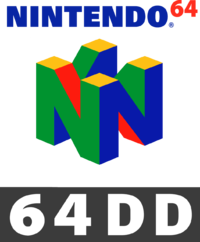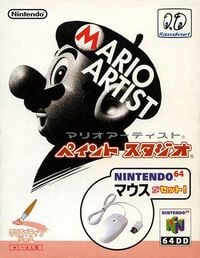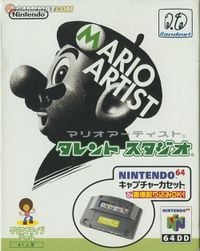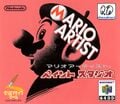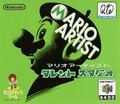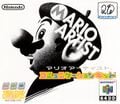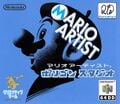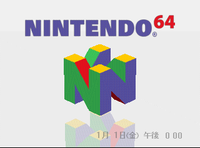Nintendo 64DD: Difference between revisions
m (Text replacement - "{{[Ss]ystem-infobox" to "{{system infobox") |
m (Text replacement - "{{[Rr]eleased" to "{{release") |
||
| Line 2: | Line 2: | ||
|image=[[File:64DD Console.png|250px]] | |image=[[File:64DD Console.png|250px]] | ||
|generation=Fifth | |generation=Fifth | ||
|released={{ | |released={{release|Japan|December 1, 1999}} {{release|USA|Planned for 2000 (Canceled)}} | ||
|discontinued=February 28, 2001<ref>https://web.archive.org/web/20010413234643/http://www.randnetdd.co.jp</ref> | |discontinued=February 28, 2001<ref>https://web.archive.org/web/20010413234643/http://www.randnetdd.co.jp</ref> | ||
|predecessor=[[Nintendo 64]] | |predecessor=[[Nintendo 64]] | ||
Revision as of 06:26, May 4, 2022
| Nintendo 64DD | |
|---|---|
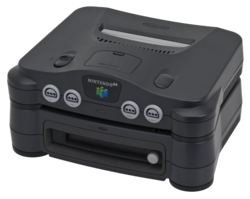
| |
| Generation | Fifth generation |
| Discontinued | February 28, 2001[1] |
| Predecessor | Nintendo 64 |
| Successor | Nintendo GameCube |
The Nintendo 64DD (short for 64 Dynamic Drive)[2] was a disk drive unit that, like the Family Computer Disk System, attached to a Nintendo 64 and could play games in a magnetic disk format, with the disks containing their own internal memory written through the N64 instead of the disk itself. There were also several peripherals used for it.
While originally planned to release concurrently with the base Nintendo 64, the system was ultimately released in Japan in December 1999, following numerous developmental delays. It was scheduled for release in North America in 2000, but it ended up being a commercial failure both due to its belated Japanese release and due to the way it was sold (mainly through subscription to the Randnet online service, with little to no retail units in stores); consequently, the planned American release was cancelled, leaving the add-on exclusive to Japan. A remnant of this eventually resurfaced on July 15, 2016, when YouTuber MetalJesusRocks (Jason Lindsey) posted a video showcasing a then-recently-discovered prototype for an American 64DD with an included developer's disk, both of which were verified as legitimate by former Nintendo of America employee Mark DeLoura.[3] On September 2, 2016, MetalJesusRocks did a follow up on his American 64DD with YouTuber Hard4Games (Tony Visintainer).[4][5]
There were four Mario games released on this console, all in the Mario Artist series; there were also several canceled Mario titles. Overall, there were only nine games released on the Nintendo 64DD, although other games planned for the console were released on the original Nintendo 64, the Sony PlayStation, the Sega Dreamcast, the next-generation Nintendo GameCube, or canceled altogether.
Accessories
This article's name is conjectural for a part of its content. If an official name is found for the currently unnamed portion of content, it may need to be split into a new article.
Mouse
NUS-017, this replaced analog stick input to allow more precise cursor movements in games that supported it, such as the Mario Artist series.
Modem Cartridge
NUS-029, this allowed the Nintendo 64 connect to Randnet. Mario Artist: Communication Kit made use of this accessory directly.
AV-In Cartridge
NUS-028, this allowed the Nintendo 64 to take in RCA and microphone as input. Mario Artist: Talent Studio made use of this accessory.
 This section is a stub. You can help the Super Mario Wiki by expanding it.
This section is a stub. You can help the Super Mario Wiki by expanding it.
Mario franchise games
Released
- Mario Artist: Paint Studio
- Mario Artist: Talent Studio
- Mario Artist: Communication Kit
- Mario Artist: Polygon Studio
Canceled
- Mario Artist: Game Maker
- Mario Artist: Graphical Message Maker
- Mario Artist: Sound Maker
- Mario Artist: Video Jockey Maker
- Mario Paint 64
- Mario Party
- Mario Party 2
- Super Mario 64 2
- Super Mario 64 (disk version)[6][7]
- Super Mario RPG 2 (released on the Nintendo 64 as Paper Mario)
- Donkey Kong World, also known as Ultra Donkey Kong and Donkey Kong Universe (reworked into Donkey Kong 64 for the Nintendo 64)
Game gallery
Media
| File info 0:05 |
Trivia
- If there is no game inserted into the system, the start-up appears as usual, but Mario then appears and plays around with the Nintendo 64 logo. The N shape changes when Mario interacts with it.[8]
- Mario Party originally was supposed to be compatible with the Nintendo 64DD, suggesting that Mario Party 2 was originally supposed to serve as an expansion disk to it.[9]
References
- ^ https://web.archive.org/web/20010413234643/http://www.randnetdd.co.jp
- ^ Schneider, Peer (February 9, 2001). "Everything About the 64DD". IGN. Retrieved June 12, 2014.
- ^ https://www.youtube.com/watch?v=b64Bx0WKh7M
- ^ https://www.youtube.com/watch?v=Pe-fs1COgr0
- ^ https://www.youtube.com/watch?v=FgwM_Zg1U8k
- ^ Bodamin, Kadu. Super Mario 64 Disk Version existe? Fã mostra em vídeo esta curiosa versão do game rodando em Nintendo 64 japonês Reino do Cogumelo. June 25, 2014.
- ^ http://gamingafterhours.com/2014/06/24/super-mario-64dd-version-discovered-in-japan/
- ^ http://www.youtube.com/watch?v=b6tECCX3B4g
- ^ https://www.youtube.com/watch?v=yKu5lABxR2Q
